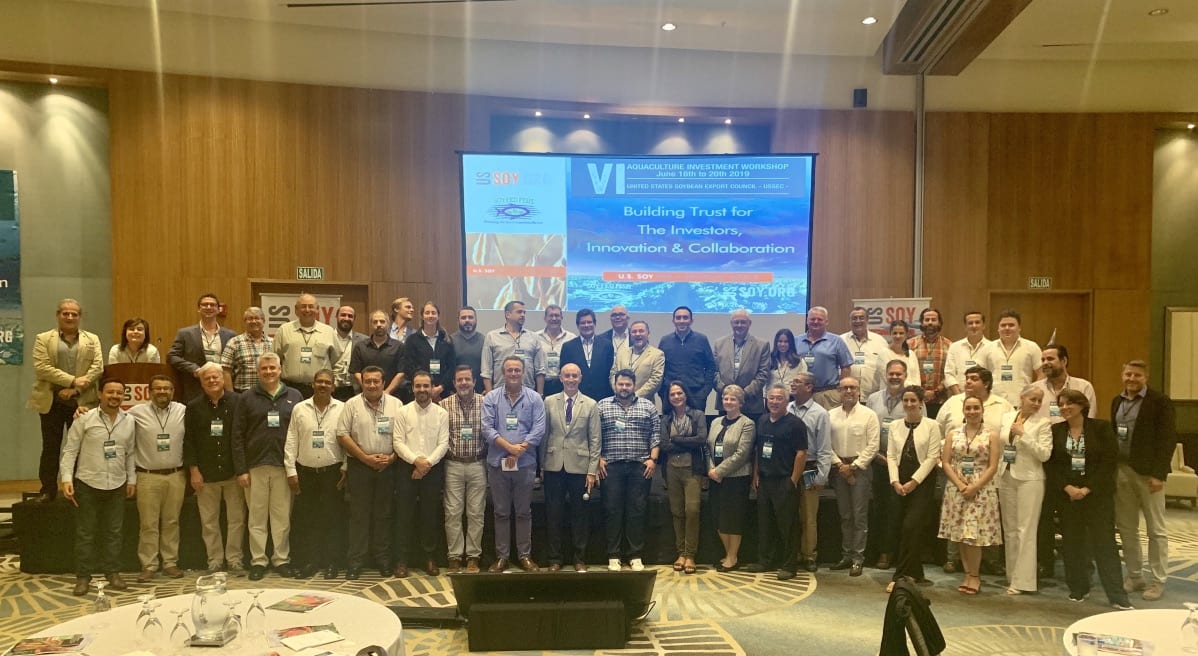Aquaculture Stakeholders Get Value from USSEC’s VI-Aquaculture Investment Workshop
- Category:
- Aquaculture
- General News

USSEC hosted the VI-Aquaculture Investment Workshop in Panama City, Panama on June 19 and 20. More than 90 aqua industry participants, including aqua producers, feed companies, government, seafood buyers, bankers, and technicians, from more than 14 countries attended the specialized workshop. During those two days, more than 25 speakers invited by USSEC gave lectures and recommendations, and raised business to attendants, all related to aquaculture production, mainly marine fish culture.
This workshop was organized and designed by USSEC with the primary objective of bringing together the main aquaculture industry participants, such as aqua producers, aqua feed producers, researchers, government officials, investors, and seafood importers, to put forth the issues that may be delaying the expansion of the marine aquaculture industry and aquaculture as a whole in the Americas region, as well as to define what can be done to accelerate expansion and creation of markets for these aquaculture products. This additional investment and efforts would grow the industry and increase future demand for U.S. soy products in aquaculture.
The second objective reached was to present other alternatives in aquaculture production; that is, alternatives to tilapia and shrimp culture, such as commercially relevant marine fish species to private investors in the Americas region, as well as the investment community in the U.S.
USSEC hosted the two-day investment workshop to outline investment opportunities in all segments of the production and market chain. There were discussion sessions and panels during the seminar. Different topics were discussed during the presentations and panels, such as technical presentations by aqua experts, regulatory issues by government officials, investment opportunities by regional investors, investment funds available by venture capital investors, and market opportunities by buyers of seafood from the U.S. and the Americas region. Daily business sessions took place among the participants, which achieved concrete opportunities for producers, buyers, technicians, and government officials.
The first day’s agenda focused on the aquaculture business, overview, opportunities, and challenges as well as advances on technology and innovation. The experts reported on trends in production, technology, sustainability, weather impact, aquaculture animal welfare, nutrition, and research priorities for aquaculture expansion. USSEC aquaculture consultants and U.S. soy grower leaders welcomed the attendees and gave a summary of U.S. soy production, emphasizing the sustainability protocol.
Day two focused on information of seafood supplies, market access, processing situation, finance, and banking and investment opportunities. Case studies of successful marketing of seafood in the Mexico and U.S. were presented. Finally, banking experts and financial representatives addressed topics related to the financial opportunities available in the industry for investors interested in investing in the aquaculture industry as a good opportunity for both. The issues related to investment risk that can be given to investing in this industry as well as the opportunities with insures for the industry were also presented. To close the journey of presentations, the USSEC representative from Southeast Asia talked about the current situation of marine fish culture in Asia, trends, and markets.
At the end of the workshop a general panel of discussion with experts, speakers, and guests elaborated on final conclusions and letter of compromises to develop over the coming years. The group concluded that opportunities for innovation and collaboration are mainly reaching financing, correct regulation, environmental commitment, health transparency, innovation and efficiency, as well as product differentiation, that will set the standards for a sustainable and profitable growth of mariculture in the Americas region.
USSEC will continue supporting the sustainable growth of the aquaculture industry around the world as a source of animal protein production for humanity.
